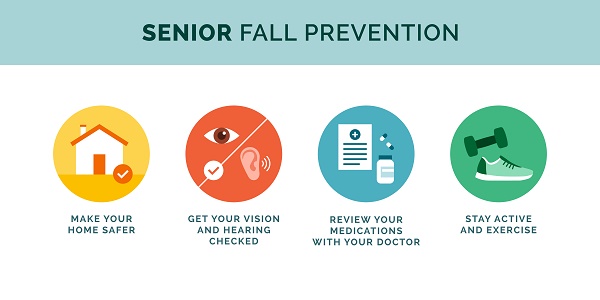Preventing Outpatient Falls & Injury in Older Adults
Stacey J. Drubner, JD, LICSW, MPH

While anyone can fall or sustain injuries from a fall, in individuals over 65, these events lead to serious health complications, future falls, and a higher risk of death. In addition to physical injury, falls can also cause psychological distress, shame and stigma.
Despite many falls going unreported, statistics are staggering. In 2021, the CDC reported:
- 3 million emergency departments visits related to falls
- The age-adjusted fall death rate for older adults increased by 41% (since 2012), accounting for 38,000 deaths
Much of the attention and standards of care on falls prevention is on the inpatient setting, although the majority of falls occur outside of the hospital, in the home. Below, we will discuss how to prevent falls and minimize injury in the outpatient setting.
Risk Factors for Falls
There are many reasons why people fall, and often, a number of circumstances combine to make a perfect storm for a fall and resulting injury. Here are some of the most common causes:
- A previous fall
- Safety hazards in the home (rugs, furniture set-up, slippery surfaces in bathroom)
- Level of physical fitness
- Health conditions which affect gait, strength & balance
- Cognitive issues
- Eyesight & hearing deficits
- Medications
- Use of substances, such as alcohol
- Incontinence & trouble with accessing the bathroom in time
- Distraction & lack of mindfulness
- Risky behaviors (climbing on ladders)
Strategies for Preventing Falls & Injury

Given the many possible consequences of an elderly person experiencing a fall, the ideal approach is to take measures to prevent falls and serious side effects from occurring at all.
Partner with older relative
A first step in this process is to work with you elder relatives to prevent falls. This is definitely easier said than done, because it may feel like an intrusion to privacy and a threat to their independence. When approaching loved ones try to communicate with honesty and compassion. Encourage them to take a role in their health and well-being and educate them about the consequences of having a fall. Help them to understand that falling is one of the biggest threats to their well-being and self-determination. Highlight that many falls are preventable and that at the very least they can limit their chance of serious injury.
Get solid baseline for likelihood of falling
- Do a self-assessment
- Have a discussion with the PCP
- Local elder services can provide home safety assessments
Take steps to minimize as many risks as possible
- Make the home environment as safe as possible
- Understand relevant side-effects of medications and establish a plan for possible falls
– Don’t leave loved ones unattended while on these medications
– Request an alternative from the prescribing provider
– Avoid drinking alcohol if it could increase impacts on the central nervous system
- Keep on top of health issues (diabetes, blood pressure) which may have an indirect impact on falls
– In particular, be mindful of Postural Hypotension
- Check and address hearing or sight issues
- Monitor and address bone density with supplements, healthy eating, and avoiding smoking & alcohol
- Improve strength and balance via exercise (walking, yoga, Pilates, weight training)
– SRH Falls Prevention Program
- Walk heel-toe
- Wear “fall- resistant” shoes that have good treads & support walking well
- Be mindful & pay attention to what you are doing. This allows you to notice an uneven sidewalk or uneven pavement
- Reduce stress – via sleep, exercise & diet
- Have a medical alert device to call for help. Apple watches have a falls feature
- Have a system to check in regularly
- Regularly engage with and inform providers -they can make referrals for physical therapy, assistive devices (walkers, shower chairs) & tailor medications
If a fall does happen, don’t be too hard on yourself or elderly relative. Falls can make all involved feel a sense of defeat. Keep in mind that many, but not all falls can be prevented. It’s important not to be judgmental or scold elder relatives This will just make them feel worse and could keep them from asking for assistance with falls prevention or response in the future.
Other Family Caregivers Month EAP Features
Caring for the Family Caregiver: Recognizing & Addressing Caregiver Stress
Helping Families Navigate Elder Transitions
Helping Older Relatives with Managing their Healthcare and Financial Affairs
Help from the EAP
The EAP offers free and confidential services for employees and immediate household family members. EAP records are separate from medical and HR records. Contact the EAP at 866-724-4327 or request an appointment via our online form for confidential assistance. In-person appointments are available at the following locations. Phone or Video (Zoom) appointments are available from all locations.







